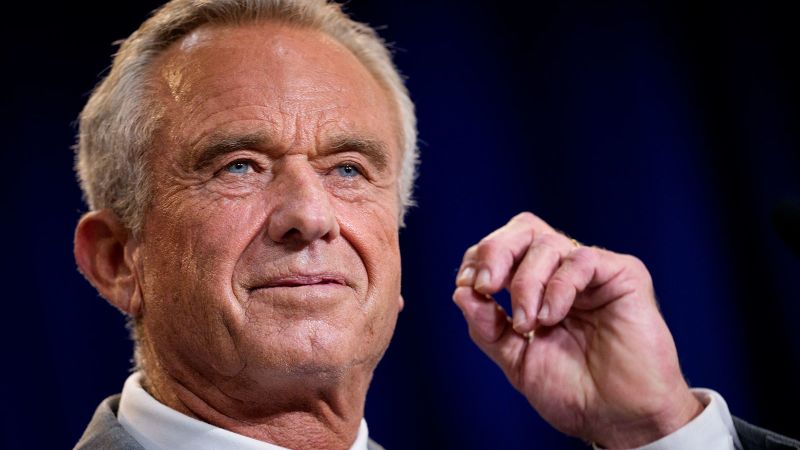Sure! Here’s a detailed and engaging article analyzing the contentious narrative surrounding Robert F. Kennedy Jr. and COVID-19 vaccine policy:
—
### Analyzing Controversies Surrounding Kennedy’s COVID-19 Vaccine Policy Shift
In a world grappling with an ongoing pandemic, the discourse around COVID-19 vaccines has become increasingly polarized. Robert F. Kennedy Jr., the recently appointed Secretary of the Department of Health and Human Services (HHS), has stirred considerable controversy with his declaration that the Centers for Disease Control and Prevention (CDC) would no longer recommend COVID-19 vaccines for pregnant women and healthy children. This announcement has sparked an intense backlash from pediatricians and public health officials, raising pressing questions about the integrity of the underlying science.
#### Questionable Sources and Scientific Claims
A recent document circulated by HHS to congressional lawmakers aimed to support Kennedy’s shift in policy. However, critics have scrutinized this document, accusing it of mischaracterizing numerous studies and leaning on unpublished or disputed research. Notably, some experts have labeled it as “willful medical disinformation,” highlighting its potential risks to public health.
Mark Turrentine, a professor of obstetrics and gynecology at Baylor College of Medicine, remarked, “It is so far out of left field that I find it insulting to our members of Congress.” His concerns underscore the implications of misleading information on legislative decisions regarding health policy, as members of Congress often rely on data from reputable agencies like HHS.
#### The HHS Document: A Deeper Dive
The document, titled “COVID Recommendation FAQ,” is the first attempt by HHS to explain Kennedy’s controversial announcement. Although not publicly posted on their website, its contents have sent shockwaves throughout the medical community. Critics argue that the document distorts legitimate research while presenting unpublished studies that are currently under scrutiny.
Andrew Nixon, the HHS director of communications, defended the document’s contents, asserting that the information is grounded in legitimate safety concerns. He emphasized, “HHS will not ignore that evidence or downplay it,” signaling a commitment to an evidence-based approach in decision-making.
#### Expert Critiques of the Document
Medical experts are alarmed by the claims made within the HHS document. Sean O’Leary, chair of the Committee on Infectious Diseases for the American Academy of Pediatrics, stated, “This has been [Kennedy’s] playbook for 20 years,” pointing to his history of cherry-picking scientific data to fit preconceived narratives.
Additionally, some studies cited in the document have been criticized for not presenting a balanced view. For instance, one study referenced by HHS was flagged for potentially flawed research methodology and undisclosed conflicts of interest by its authors. Moreover, another cited study is yet to undergo peer review, leading experts to remind the public that relying on such data for clinical guidance is premature and risky.
#### Distorted Research and Safety Concerns
The HHS memo claims that “post-marketing studies” have identified serious adverse effects from COVID-19 vaccinations, including myocarditis and pericarditis. An alarming narrative has emerged on social media, falsely suggesting that these conditions only emerged in vaccinated individuals. In reality, the studies presented do not compare vaccine outcomes to those who contracted COVID-19, thereby obfuscating the true risk narrative.
O’Leary noted that while some isolated cases of myocarditis followed vaccination, these have notably declined over time as vaccination protocols evolved. He stressed, “There is no increased risk at this point,” highlighting the importance of contextualizing data around vaccine safety.
#### Conflicting Claims and Legislative Implications
The document has not only been criticized for its claims but also for its application of the cited studies. In instances where the supporting papers advocate for vaccine safety, the HHS memo has erroneously claimed otherwise. “I’ve read it three times. And I cannot find that anywhere,” said Turrentine, expressing his frustration with the document’s factual inaccuracies.
This situation escalates further when considering legislative actions. Following Kennedy’s announcement, Rep. Frank Pallone and Dr. Kim Schrier introduced a bill aimed at reinstating the Advisory Committee on Immunization Practices (ACIP) to oversee vaccine recommendations. This move reflects an effort to ensure that public health policies are informed by sound science rather than political maneuvering.
#### Communication Gaps and Public Confidence
The responses from members of Congress, especially those with medical backgrounds, signal a troubling narrative about trust in scientific discourse. Neil Silverman, who directs the Infectious Diseases in Pregnancy Program at UCLA, stated that legislators may not possess the expertise to assess the veracity of such documents critically. The potential misinterpretation of HHS communication could have far-reaching consequences, potentially misleading public perceptions of vaccine safety.
C.J. Young, deputy communications director for the House Energy and Commerce Committee, reflected on the unprecedented nature of this scenario, stressing the importance of scientific integrity in policy-making processes.
#### A Shifting Perspective
Kennedy’s recent actions, including proposing to replace ACIP members with individuals critical of vaccine mandates, suggest a deliberate shift in the leadership and approach toward vaccine recommendations. As discussions continue, public health advocates remain watchful, hoping for a return to a more evidence-backed dialogue surrounding vaccine policy.
The ongoing developments surrounding Kennedy’s administration and its implications for public health underline the critical nature of adhering to rigorous scientific standards in health policies. As we navigate this tumultuous landscape, it’s essential to foster a well-informed populace aware of the nuanced discussions approaching public health issues.
—
This article attempts to present a balanced and informative perspective on a complex topic while engaging readers in the ongoing public health discourse.


